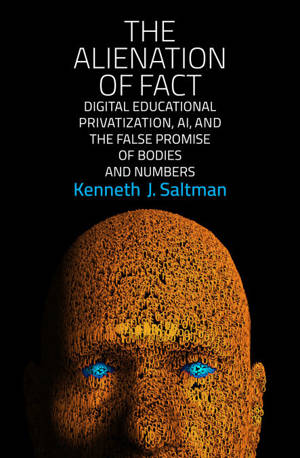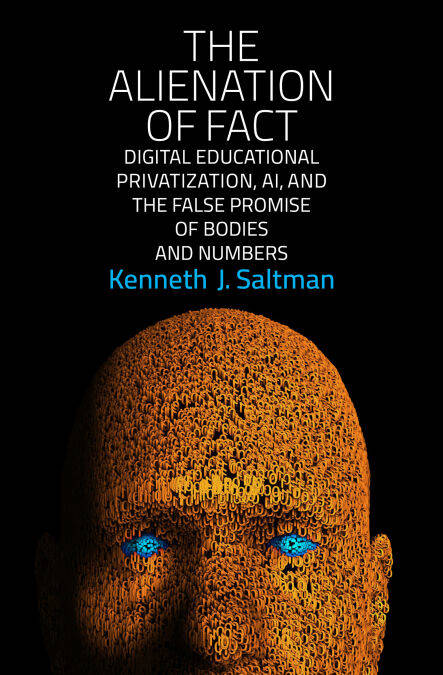
- Retrait gratuit dans votre magasin Club
- 7.000.000 titres dans notre catalogue
- Payer en toute sécurité
- Toujours un magasin près de chez vous
- Retrait gratuit dans votre magasin Club
- 7.000.0000 titres dans notre catalogue
- Payer en toute sécurité
- Toujours un magasin près de chez vous
The Alienation of Fact EBOOK
Digital Educational Privatization, AI, and the False Promise of Bodies and Numbers
Kenneth J. Saltman
Ebook | Anglais
24,63 €
+ 24 points
Format
Description
An investigation of the role of educational privatization and technology in the crises of truth and agency.
Today, conspiracy theories run rampant, attacks on facts have become commonplace, and systemic inequities are on the rise as individual and collective agency unravels. The Alienation of Fact explains the educational, technological, and ideological preconditions for these contemporary crises of truth and agency and explores the contradictions and competing visions for the future of education that lie at the center of the problem.
Schools are increasingly reimagined as businesses, and high-stakes standardized testing and curricula, for-profit charter schools, and the rise of educational AI put capital and technology at the center of education. Yet even as our society demands measure, data, and facts, politicians and news outlets regularly make unfounded assertions. How should we make sense of the contradictions between the demand for radical data-driven empiricism and the flight from evidence, argument, or theoretical justification?
In this critical investigation of the new digital directions of educational privatization—AI education, adaptive learning technology, biometrics, the quantification of play and social emotional learning—and the politics of the body, Saltman shows how the false certainty of bodies and numbers replaces deliberative and thoughtful agency in a time of increasing precarity. A distinctive contribution to scholarship on public school privatization and educational technology, politics, policy, pedagogy, and theory, The Alienation of Fact is a spirited call for democratic education that values creating a society of “thinking people” over capitalistic gains.
Today, conspiracy theories run rampant, attacks on facts have become commonplace, and systemic inequities are on the rise as individual and collective agency unravels. The Alienation of Fact explains the educational, technological, and ideological preconditions for these contemporary crises of truth and agency and explores the contradictions and competing visions for the future of education that lie at the center of the problem.
Schools are increasingly reimagined as businesses, and high-stakes standardized testing and curricula, for-profit charter schools, and the rise of educational AI put capital and technology at the center of education. Yet even as our society demands measure, data, and facts, politicians and news outlets regularly make unfounded assertions. How should we make sense of the contradictions between the demand for radical data-driven empiricism and the flight from evidence, argument, or theoretical justification?
In this critical investigation of the new digital directions of educational privatization—AI education, adaptive learning technology, biometrics, the quantification of play and social emotional learning—and the politics of the body, Saltman shows how the false certainty of bodies and numbers replaces deliberative and thoughtful agency in a time of increasing precarity. A distinctive contribution to scholarship on public school privatization and educational technology, politics, policy, pedagogy, and theory, The Alienation of Fact is a spirited call for democratic education that values creating a society of “thinking people” over capitalistic gains.
Spécifications
Parties prenantes
- Auteur(s) :
- Editeur:
Contenu
- Nombre de pages :
- 232
- Langue:
- Anglais
Caractéristiques
- EAN:
- 9780262371742
- Date de parution :
- 21-11-22
- Format:
- Ebook
- Protection digitale:
- Adobe DRM
- Format numérique:
- ePub

Les avis
Nous publions uniquement les avis qui respectent les conditions requises. Consultez nos conditions pour les avis.






